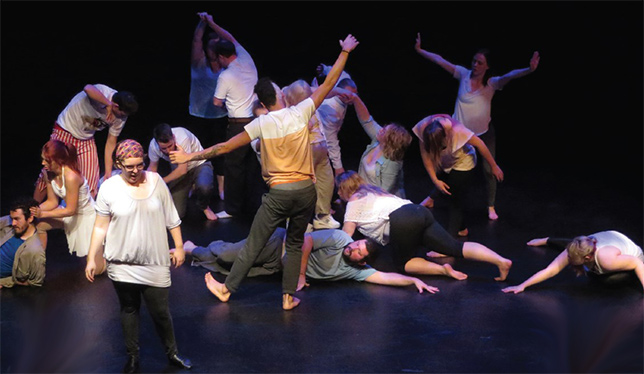This past fall at the University of Lethbridge, Professor Lisa Doolittle’s dance and theatre class had 19 students, six of whom have an intellectual disability. “It’s very compelling work,” says Dr. Doolittle of this experiment in inclusive performing arts. “Once you get in there you realize the potential. The transformations that happen are quite astonishing.”
The class was a collaboration between the professor and two local organizations that advocate on behalf of persons with developmental disabilities: the Southern Alberta Individualized Planning Association and the Lethbridge Association for Community Living. Dr. Doolittle is also pursuing this work as a co-investigator of a larger research partnership funded by the Social Sciences and Humanities Research Council. In 2013, SSHRC awarded a $2.5-million grant over five years to support the Art for Social Change project, which involves six universities and 40 community partners.
Dr. Doolittle says she hasn’t begun the formal research yet, but did conduct a debriefing with her students after the class. Citing students’ feedback, she says, “You develop a different kind of radar, a different kind of understanding. You see how seamless relationships can be. You stop objectifying the ‘other.’ ”

The students are continuing this work, creating a mixed-abilities production to be shown over five nights in March on the university’s main stage. Dr. Doolittle says the show’s theme is a big party, with characters developed by the cast members. Pamela Boyd, a former artistic director of MoMo, Calgary’s mixed ability theatre and dance company, has been working with her on the project.
The families of the persons with disabilities, and the organizations that work with them, have noticed how this work has transformed these individuals. “I had one mother [who has a son with Down’s syndrome] come up to me after the show and say, ‘Before you started working with my son, we thought we were losing him to dementia. Now he’s back to being himself,’” Dr. Doolittle recounts.
The abled students, meanwhile, “say they would never look at somebody with a disability the same way again,” she continues. “By the end of the class it was completely normalized, the whole community had pulled together.”
Dr. Doolittle says she hopes the collaboration can continue but funding is an issue – four of the six students with disabilities had their tuition paid through an anonymous donation. “University is a venue where socialization happens, where people are integrated into a bigger world, and it’s not right for people with disabilities to be denied that experience,” she says. “These people who have been in my class now know how to work as a team, collaborate, speak in front of a large number of people. They’ve made progress. And I think my research will show certain types of capacities have increased.”